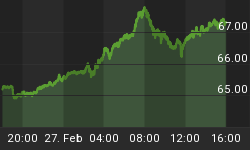Watching the world's leaders stumble their way through the economic crisis, it often feels as if political success and economic understanding are mutually exclusive. Even the Chinese, who over the past generation have engineered a dramatic turnaround from their Maoist economic nightmare, show a remarkable willingness to pursue a monetary policy (a currency peg to the U.S. dollar) that yields no benefit to their citizens. Amid this morass of economic quackery, it is refreshing to see a clear ray of sanity emanating from one country: Poland.
Last summer, I was invited to speak at the Economic Forum in Krynica, a resort town in Southern Poland. I was amazed at the level of economic activity and civic spirit that was on display throughout the country. I also was fairly surprised that my economic views, which are routinely ridiculed at home, have much wider support among the Polish economic officials who presented at the conference.
This common sense understanding was showcased in an opinion piece published this week in the Financial Times by Polish Finance Minister Jacek Rostowski. Contrary to the public flogging of the free market currently underway in Washington, under the auspices of the Financial Crisis Inquiry Commission, Rostowski explains how governments caused the Crash of 2008 by removing the necessary element of fear from the markets. He states that this was symptomatic of the "deep Keynesian project," in which governments over the last half century have looked to smooth the economic cycle through periodic floods of monetary expansion and government spending. I couldn't have said it better myself.
A product of the Solidarity movement that opposed the Polish Communist Party in the 1980's, Mr. Rostowski, like many of his colleagues in the current Polish Administration, is intimately familiar with the hazards of central economic planning. He has seen this movie before, and he knows how it ends.
Instead, Poland has enacted economic policies that are informed by a belief in Austrian School (read: free market) economics. After the downfall of the Communists in 1989, Rostowski was part of a group that called for "shock therapy": the rapid privatization of state-owned enterprises and the dismantling of price and currency controls.
In 2007, the center-libertarian Civic Platform party was put in power, with Rostowski as Finance Minister. Along with Prime Minister Donald Tusk, he has continued the process of transforming Poland into a laissez-faire paradise. Not accidentally, Poland is the only EU member state that showed positive GDP growth in 2009, at 1.9%. Also its public debt, at roughly 55% of GDP, compares favorably with its neighbors - and with the United States.
A top priority of their administration was reduction of the income tax. The previous system, with three-tiers of 19%, 30%, and 40%, has been reduced to two tiers: 18% and 32%. In addition, the system's minimal use of deductions and credits makes it radically simpler than the U.S. income tax.
In the meantime, Civic Platform is continuing its move toward privatization. Recently, Poland held an IPO for its state-owned power utility, Polska Grupa Energetyczna. According to a news report, "The sale brought in $2.1bn, pricing at the top end of the bankers' guidance range, and becoming Europe's largest IPO of the year." The government has used these revenues to fund its budget and keep taxes in check. More importantly, it has returned capital to the marketplace to be used in the most efficient manner.
Civic Platform also understands that regulation hurts small business disproportionately by raising barriers of entry. Fortunately for Poland, a multi-year program of deregulation has been a boon for small businesses, and has given the country the most entrepreneurs of any state in Europe. This may explain the country's resilience in the face of the global economic crisis.
Poland's current growth is also fueled by an influx of foreign investment. To encourage such inflows, Rostowski has laid out a specific plan to adopt the euro as the country's currency by 2015. While I have never been crazy about the euro concept, as opposed to a gold standard, the effort indicates to foreign investors a desire to control inflation. Assuming the block is able to stick together, the European Central Bank is considered a reliable enforcer of strict monetary policy. Poland's zloty rapidly devalued after it was allowed to float, and though the rate of inflation is declining, it remains high. Eurozone membership will impose external discipline on the Polish government, even if Civic Platform loses power.
Anecdotally, I can attest that these people are hungry for free markets. My visit to Krynica was a breath of fresh air, and a startling reminder of how far America has strayed. If the Polish people can hold onto the traumatic lessons of communism, and continue undeterred down their current path, then this battleground of the 20th century may be the paragon of the 21st.
For a more in-depth analysis of our financial problems and the inherent dangers they pose for the U.S. economy and U.S. dollar, read Peter Schiff's 2008 bestseller "The Little Book of Bull Moves in Bear Markets" and his newest release "Crash Proof 2.0: How to Profit from the Economic Collapse." Click here to learn more.
More importantly, don't let the great deals pass you by. Get an inside view of Peter's playbook with his new Special Report, "Peter Schiff's Five Favorite Investment Choices for the Next Five Years." Click here to dowload the report for free. You can find more free services for global investors, and learn about the Euro Pacific advantage, at www.europac.net.















